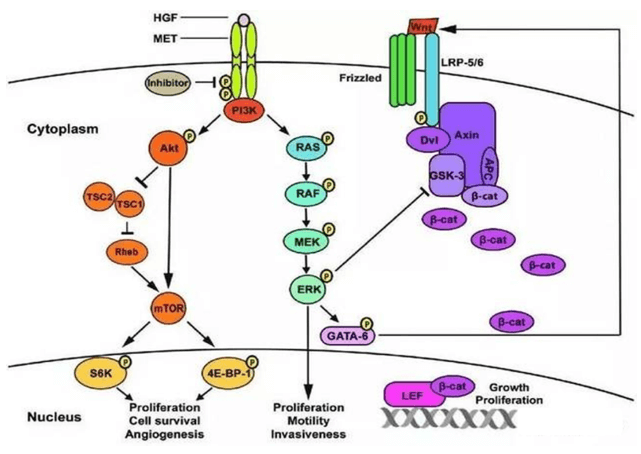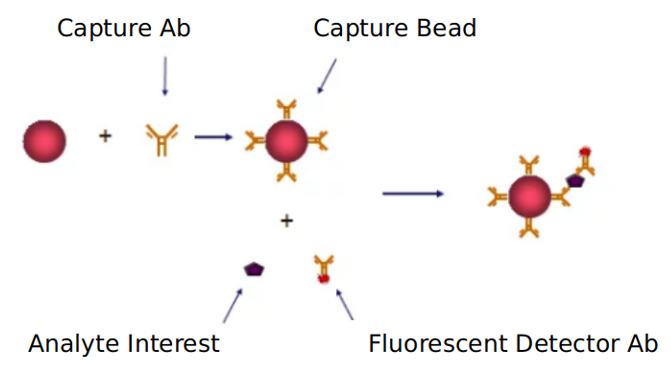HGF signaling pathway
Based on Luminex technology platform, Creative Proteomics provides analysis services for key targets of hepatocyte growth factor signaling pathway.
 (Fan S, et al., 2019)Hepatocyte growth factor (HGF) is a multifunctional cytokine originally described as a mesenchymal-derived factor that regulates cell growth, cell motility, morphogenesis, and angiogenesis by activating its receptor, a transmembrane tyrosine kinase encoded by the c-Met proto-oncogene. hGF and c-Met are frequently co-expressed or overexpressed in a variety of human malignancies, including glioblastoma tumors and medulloblastoma; and their expression levels correlate with poor prognosis.
(Fan S, et al., 2019)Hepatocyte growth factor (HGF) is a multifunctional cytokine originally described as a mesenchymal-derived factor that regulates cell growth, cell motility, morphogenesis, and angiogenesis by activating its receptor, a transmembrane tyrosine kinase encoded by the c-Met proto-oncogene. hGF and c-Met are frequently co-expressed or overexpressed in a variety of human malignancies, including glioblastoma tumors and medulloblastoma; and their expression levels correlate with poor prognosis.
HGF an endogenous tissue repair factor, attenuates apoptosis in many primitive cell types. the HGF signaling pathway eliminates Ang II-induced apoptosis by inhibiting cytochrome c release, caspase-3 activation, and DNA fragmentation. RNA immunoprecipitation experiments show that HGF stabilizes Bcl-xL mRNA by increasing nucleotide binding to the 3' untranslated region of Bcl-xL mRNA, which is associated with the cytoplasmic localization of nucleotides. hGF also blocked Ang II-induced caspase-3 activation and lactate dehydrogenase release in tissue explants in an ERK-dependent manner.
HGF and its receptor c-MET are commonly expressed in malignant gliomas and embryonic neuroectodermal tumors, including medulloblastomas, and appear to play an important role in the growth and propagation of these malignancies. Depending on the cellular context and the involvement of specific downstream effectors, HGF is shown to have both pro- and anti-apoptotic effects.
Our detectable targets:
| RTK | PI3K | TYK2 | STAT1 | STAT2 | STAT3 |
| PSGL1 | TLR3 | MAPK | TRAF5 | MHC-II | RIP1 |
| IRS2 | TLR4 | IRF3 | PKR | icam1 | Mda-5 |
| MSK1 | Rac1 | CREB | mTOR | IRS1 | MEKK1 |
| Tak1 | MYD88 | TRAF6 | ISRE | MEK6 | IRF9 |
| TRIF | JNK | SH2 | Fas | p50 | GAS |
| TNFR | IRAK4 | p38MAPK | p38 | SLP76 | TRAF3 |
| ISGF3 | STAT5 | MEK3 | TLR9 | TRAM | RIG-1 |
| MSK2 | Vav | IRF5 | Rel | TCR | NFκB |
| PI3K | TBK1 | CD3 | NAP1 |
Technology platform:
We provide Luminex technology for HGF signaling pathway analysis.
Luminex technology is a multifunctional liquid phase analysis platform, which is developed on the basis of high-speed digital signal processing technology, colored microspheres, applied fluidics and laser technology. The core is the use of fluorescent dyes for encoding. By adjusting the different ratios of different fluorescent dyes, more than 100 microspheres with different fluorescence spectra were obtained. The reactions are carried out on microspheres with different fluorescent codes, such as nucleic acid hybridization, antigen-antibody, enzyme-substrate, ligand-receptor binding reactions. Using laser detection technology, qualitative and quantitative analysis of microsphere encoding and reporting fluorescence.
Advantages of HGF signaling pathway detection:
- High throughput: It can analyze more than 100 target molecules in the same sample at the same time.
- Low sample consumption: Due to the small size of the microspheres, samples as low as 1 puL can be detected, and 100 different target molecules can be detected simultaneously in the same reaction well, which greatly saves the amount of sample.
- The operation is simple and quick: The liquid phase system is adopted, the reaction time is fast, and the detection of various cytokines can be completed within 2-3 hours.

Application of our service:
- Study the impact of each clinical virus on the HGF signaling pathway
- Research on the regulatory mechanism of HGF signaling pathway in medicine
Creative Proteomics has developed a signaling pathway target detection platform. We can provide detection services not only for HGF signaling pathways, but also for other signaling pathways. If you want to detect other targets, please contact us in advance and we will customize the service for you according to your requirements. Looking forward to working with you.
Reference:
- Fan S, Gao M, et al. Role of NF-kappaB signaling in hepatocyte growth factor/scatter factor-mediated cell protection. Oncogene, 2019, 24: 1749-1766.

